Windows Media Audio (WMA) is a series of audio codecs and their corresponding audio coding formats developed by Microsoft. It is a proprietary technology that forms part of the Windows Media framework. WMA consists of four distinct codecs. The original WMA codec, known simply as WMA, was conceived as a competitor to the popular MP3 and RealAudio codecs. WMA Pro, a newer and more advanced codec, supports multichannel and high-resolution audio. A lossless codec, WMA Lossless, compresses audio data without loss of audio fidelity. WMA Voice, targeted at voice content, applies compression using a range of low bit rates. Microsoft has also developed a digital container format called Advanced Systems Format to store audio encoded by WMA.

Windows Media Player, is the first media player and media library application that Microsoft developed to play audio and video on personal computers. It has been a component of the Microsoft Windows operating system, including Windows 9x, Windows NT, Pocket PC, and Windows Mobile. Microsoft also released editions of Windows Media Player for classic Mac OS, Mac OS X, and Solaris, but has since discontinued them.
The Xbox network, formerly known and commonly referred to as Xbox LIVE, is an online multiplayer gaming and digital media delivery service created and operated by Microsoft Gaming for the Xbox brand. It was first made available to the original Xbox console on November 15, 2002. An updated version of the service became available for the Xbox 360 console at the system's launch in November 2005, and a further enhanced version was released in 2013 with the Xbox One. This same version is also used with Xbox Series X and Series S. This service, in addition to a Microsoft account, is the account for Xbox ecosystem; accounts can store games and other content.
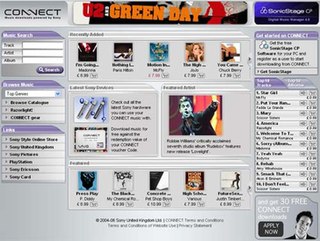
Sony Connect, stylised Sony CONNECT, was the name for a series of related software products by Sony, most notably the Connect Music Store online music store. Sony CONNECT Inc. was a subsidiary of Sony Corporation of America.
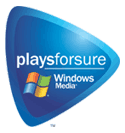
Microsoft PlaysForSure was a certification given by Microsoft to portable devices and content services that had been tested against several hundred compatibility and performance requirements. These requirements include codec support, Digital rights management support, UI responsiveness, device performance, compatibility with Windows Media Player, synchronization performance, and so on. PlaysForSure certification was available for portable media players, network-attached digital media receivers, and media-enabled mobile phones. The PlaysForSure logo was applied to device packaging as well as to online music stores and online video stores.

Napster, commonly known as “Napster 2.0”, was a music streaming service and digital music store, launched by Roxio in 2003 under the purchased name and trademarks of former free peer-to-peer file sharing software Napster in the aftermath of the latter's 2002 bankruptcy and subsequent shut down after a series of legal actions taken by the RIAA. Roxio purchased Napster and a music streaming service called PressPlay in 2003, to create a new legal online music service that lets users access music through a subscription or on a fee-per-song basis. Napster was later acquired by Best Buy. The service was acquired by rival Rhapsody in 2011.
Napster is a music streaming service based in Seattle, Washington, United States. Until 2016, the service was known domestically as Rhapsody before rebranding as Napster, the same name brand that was used by Roxio's Napster.

MSN Music was a part of MSN's web services. It delivered music news, music videos, spotlights on new music, artist information, and live performances of artists. The website also served as a digital music store from 2004 to 2008.
Yahoo! Music Jukebox, formerly known as Yahoo! Music Engine, was a freeware music player released by Yahoo! in 2005 to compete with iTunes and Rhapsody in the digital music market. Developed side-by-side with MusicMatch Jukebox, another music player acquired by Yahoo! in 2004, it was designed to be the main client for Yahoo's array of music services, which were centered around Yahoo! Music Unlimited, a paid music streaming service and digital music store; in addition to being a music management software. In early 2008 Yahoo! sold off its music assets, including Yahoo! Music Jukebox to RealNetworks' Rhapsody and replaced it with a web-based music player.
Xbox Games Store is a digital distribution platform currently used by Microsoft's Xbox 360 video game console and formerly by the Xbox One. The service allows users to download or purchase video games, add-ons for existing games, game demos along with other miscellaneous content such as gamer pictures and Dashboard themes.
MusicGremlin was a portable digital music player, as well as a subscription based online music service that could be accessed wirelessly directly from the device without the use of an intermediate computer. Both the player and the service were provided by a small New York based company, MusicGremlin Inc. The company was founded by Jonathan Axelrod and Robert Khedouri. The company was bought in 2008 by SanDisk.

Zune is a defunct brand of digital media products and services that was marketed by Microsoft from November 2006 until it was discontinued in June 2012. Zune consisted of a line of portable media players, a music subscription service known as Zune Music Pass plus Zune Marketplace for music, TV and movies, streaming services for the Xbox 360 game console, and the Zune software media player for Windows PCs which also acted as desktop sync software for Windows Phone.

MOG was a paid subscription online music service and blog network, where subscribers could listen to and read about music. Subscribers could play tracks available in its catalog on a variety of digital devices, including computers, handheld devices, Sonos systems and television. MOG also allowed users to access aggregated editorial content from music blogs, user posts, and in-house editors.
SpiralFrog was a very early music streaming service based in New York City that launched in the United States and Canada on September 17, 2007. SpiralFrog offered free and legal music downloads, all supported by advertising, and was the largest site of its kind in North America. On March 19, 2009, SpiralFrog terminated operations due to loan recalls. While SpiralFrog was not successful in the end, it nonetheless helped shaped the digital music industry shift from the purchase to streaming models, and its ultimate revenue recovery

Zune is a discontinued software program that was developed by Microsoft for Windows that functions as a full media player, library, media streaming server, mobile device management, and interface for the discontinued Zune Marketplace. The software is used to sync with all devices with Zune functionality including the Zune 4, 8, 16, 30, 80, 120, Zune HD, Windows Phone 7, and Microsoft Kin. Zune devices work exclusively with the Zune software, which applies many design principles of Microsoft's Metro design language.
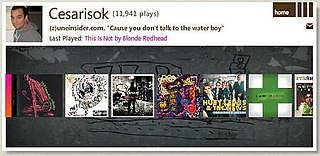
Zune Social was the online component of Microsoft's Zune initiative. It was a social networking website that displayed a user's most-played artists, favorite and recently played songs, a list of the users friends, what the user's friends were listening to, and any comments about them. It has been compared to iLike and Last.fm in that it tracked and displayed, or "scrobbled", songs that the user had played.
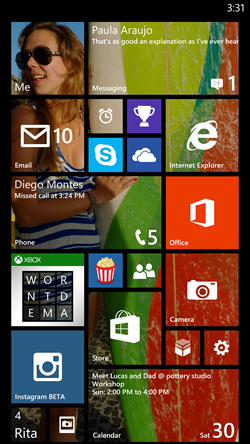
Windows Phone (WP) is a discontinued mobile operating system developed by Microsoft for smartphones as the replacement successor to Windows Mobile and Zune. Windows Phone featured a new user interface derived from the Metro design language. Unlike Windows Mobile, it was primarily aimed at the consumer market rather than the enterprise market.

Kin was a short-lived mobile phone line from Microsoft designed for users of social networking. The phones, aimed at people between ages 15 and 30, were manufactured by Sharp Corporation and sold through Verizon Wireless.
Online console gaming involves connecting a console to a network over the Internet for services. Through this connection, it provides users the ability to play games with other users online, in addition to other online services.
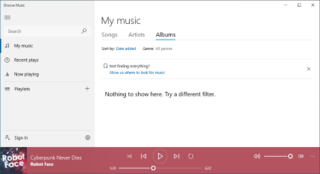
Groove Music is a discontinued audio player software application included with Windows 8, Windows 8.1, Windows 10 and Windows 11.










